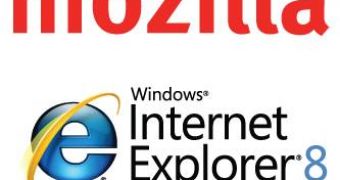The face-off between Internet Explorer and Firefox, multifaceted as it is, provides both Microsoft and Mozilla with an ample opportunity to declare superiority over each other's products. While the Redmond company still accounts for the lion's share of the operating system market, Mozilla is the undisputed top-dog when it comes down to browser extensions. Moreover, while Mozilla is gathering more and more speed, having past the 20% market share milestone, Microsoft is trying to steal the open source browser's add-on thunder. December 11 is the day when Microsoft and Mozilla will come together at the Add-on-Con event as platinum sponsors focusing on browser add-ons. Joining the two is Google, with the open source browser Chrome.
“A few of the startups building browser Add-Ons have organized the first ever Add-On Con, to take place in Mountain View on Dec 11, 2008. We thought it was such a cool idea that we decided to co-sponsor the event (Mozilla is the other sponsor). We will be giving some sessions about extending Internet Explorer, and Mozilla and Google will be presenting about their respective web browsers. Many companies with successful Add-Ons will be sharing their stories and experiences, so it’s a great education and networking event,” Joshua Allen, IE technical evangelist, revealed.
The fact of the matter is that Internet Explorer has, so far, failed to gain sufficient traction with add-on developers. At least it is nowhere near the level of Firefox. A new arrival on the browser market, Google Chrome is no contest whatsoever when it comes down to extensions. “Matt Crowley, Program Manager for Extensibility, will cover all of the extensibility options available in IE8. I will be discussing the lessons learned porting Firefox extensions to IE,” Allen stated.
According to the synopses of the Extending Internet Explorer 8 session, the next iteration of IE might just have what it takes to lure add-on developers. “Internet Explorer 8 offers a multitude of improvements and new features in its extensibility model. These changes include modifications to the browser architecture, as well as new scenarios for web service integration,” the session's summary reads.
At the same time, Microsoft is not only trying to attract add-on developers, it is attempting to convince those already building extensions for Firefox to tweak the code so it will play nice with Internet Explorer.
“If you have an existing Firefox extension that you want to port to IE to expand your audience, or if you are just getting started with development and want to re-use as much engineering effort as possible across browsers, this session is for you. Drawn from experience helping scores of companies port their Firefox extensions to Internet Explorer, this session highlights the common problems encountered and best practices for making extensions that work on both browsers. Building a full-featured add-on for Internet Explorer often means writing C++ code, and we’ll share some samples to get you quickly started on all of the most common tasks,” an excerpt of Allen session's summary reads.
Internet Explorer 8 (IE8) Beta 2 is available for download here.
Google Chrome is available for download here.
Firefox 3.1 Beta 2 for Windows is available here.
Firefox 3.1 Beta 2 for Linux is available here.
Firefox 3.1 Beta 2 for Mac OS X is available here.

 14 DAY TRIAL //
14 DAY TRIAL //